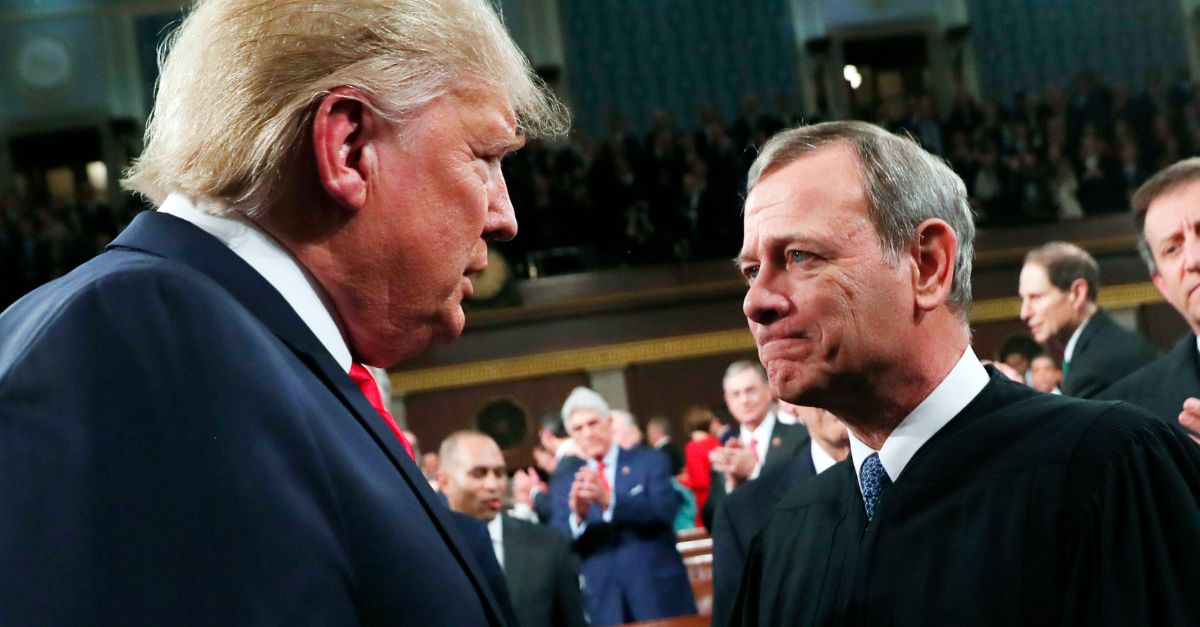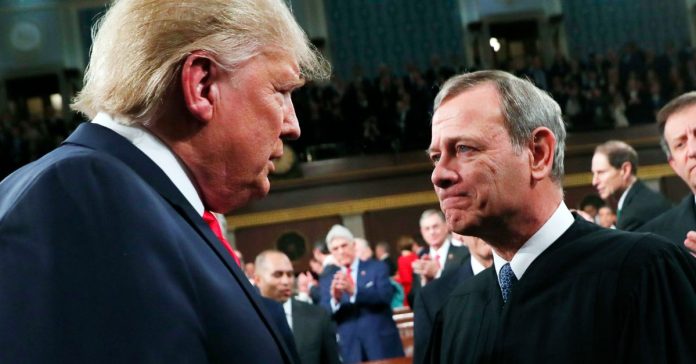
President Donald Trump greets Supreme Court Chief Justice John Roberts as he arrives to deliver his State of the Union address to a joint session of Congress in the House Chamber on Capitol Hill in Washington, Tuesday, Feb. 4, 2020 (Leah Millis/Pool via AP).
Chief Justice John Roberts handed President Donald Trump another win for now through the U.S. Supreme Court”s emergency docket, issuing a partial administrative stay of a lower court’s ruling that ordered the government to spend some $10.5 billion in congressionally appropriated foreign aid funds set to expire at the end of the month.
Six days ago, U.S. District Judge Amir Ali sided with the plaintiffs in Global Health Council v. Trump and AIDS Vaccine Advocacy Coalition v. U.S. Department of State, ruling that the administration’s move via “pocket rescission” to unilaterally cancel roughly $4 billion in funds — bypassing Congress to cut the funds — was likely unlawful.
“Defendants have a nondiscretionary duty to comply with the statutory commands in the appropriations acts by obligating the relevant funds. To be clear, no one disputes that Defendants have significant discretion in how to spend the funds at issue, and the Court is not directing Defendants to make payments to any particular recipients,” Ali wrote. “But Defendants do not have any discretion as to whether to spend the funds.”
The Government Accountability Office explains that a pocket rescission “occurs when a president asks Congress to rescind (or cancel) funds very close to the end of the fiscal year — so close that the funds expire before they can be used for new obligations.”
That is what Trump did on Aug. 28, in a letter to Speaker Mike Johnson, R-La., stating that he would not spend $4.9 billion in foreign aid.
Ali, appointed to Washington, D.C.’s federal district court by President Joe Biden in 2024, wrote that, “[t]o date, Congress has not responded to the President’s rescission proposal by rescinding the funds” and that the Impoundment Control Act is “explicit that it is congressional action — not the President’s transmission of a special message — that triggers rescission of the earlier appropriations.”
As a result, the judge issued an injunction to block the funding freeze, unless Congress acts.
The Trump administration immediately sought “shadow docket” relief at the Supreme Court.
In the government’s application for a partial stay, U.S. Solicitor General D. John Sauer asserted Monday that because Ali had for the “third time” now issued an “unlawful injunction that precipitates an unnecessary emergency and needless interbranch conflict,” SCOTUS needed to step in and put a stop to the “brinkmanship.”
Love true crime? Sign up for our newsletter, The Law&Crime Docket, to get the latest real-life crime stories delivered right to your inbox
“Once again,” Sauer said, “that court is compelling the government to obligate some $10.5 billion in foreign-aid funds that otherwise expire on September 30 — but now with even less time for further review or compliance, with even more deficient legal theories.”
Sauer specified that because the Trump administration has “already planned to obligate $6.5 billion of those funds” by the end of the month, his application for an administrative stay concerned the $4 billion Trump sought to unilaterally slash.
“The government had already planned to obligate $6.5 billion of those funds by September 30, so as to that tranche, the injunction is (as of now) merely an unnecessary nuisance,” the solicitor general said. “As to the remaining $4 billion, however, the injunction raises a grave and urgent threat to the separation of powers.”
In closing, Sauer claimed Ali had “created” an emergency out of thin air.
“The district court, not the government, has created a new emergency with little time left on the clock by issuing a new injunction based on new theories that are even more flawed than their predecessors,” the government said. “This Court should reject such brinkmanship, avert further damage to the separation of powers, and stay this injunction as soon as practicable with respect to the funds covered by the President’s rescission proposal.”
The ensuing brief order from Roberts on Tuesday stated that Ali’s order was “partially stayed” — “for funds that are subject to the President’s August 28, 2025 recission [sic] proposal currently pending before Congress pending further order of the undersigned or of the Court.”
In other words, the funds will remain frozen at least until SCOTUS rules on the Trump administration’s emergency application.
Roberts also ordered the Global Health Council and AIDS Vaccine Advocacy Coalition plaintiffs to respond by 4 p.m. on Sept. 12.
In their failed opposition to a stay, the respondents argued that the Trump administration should not be rewarded for creating the “emergency” it complains of.
“[A]lthough the government claims that it faces an ’emergency’ in having to move quickly to obligate funds, that is ‘a circumstance of their own creation,'” the filing said. “USAID and the State Department have been under a duty to obligate these funds since at least March 2024, when Congress enacted the appropriations; they chose not to act sooner.”

